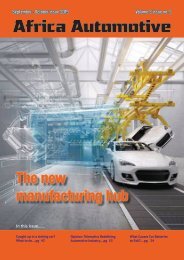Africa Automotive March-April digital issue 2023
Africa Automotive prides itself to be the ONLY Africa’s leading and MOST authoritative magazine for the automotive industry in Africa with printed copies for the automotive industry decision makers in both government, NGO’s and private sector. The Bi-monthly magazine offers cost effective advertising services that get results and improves growth in the auto B2C and B2B sector, keeping an eye on latest technologies in Africa and across the world, the magazine predominately covers the developments in the Africa auto industry.
Africa Automotive prides itself to be the ONLY Africa’s leading and MOST authoritative magazine for the automotive industry in Africa with printed copies for the automotive industry decision makers in both government, NGO’s and private sector. The Bi-monthly magazine offers cost effective advertising services that get results and improves growth in the auto B2C and B2B sector, keeping an eye on latest technologies in Africa and across the world, the magazine predominately covers the developments in the Africa auto industry.
- TAGS
- automotivetyres
- engineoiladditives
- automotiverustremover
- cardealers
- electriccars
- hydrogenpoweredvehicles
- africabusinesssummit
- trucks
- vehiclefinancing
- automotivebatteries
- carmaintenance
- africaautomotivenews
- automotivesuspension
- automotivemanufacturing
- nexusautomotive
- automotiveindustry
- automotiveaftermarket
- automotivemarketing
- africaautomotive
- africa
Create successful ePaper yourself
Turn your PDF publications into a flip-book with our unique Google optimized e-Paper software.
March-April issue l 2023
Engine oil additives
“
Friction is the enemy of
engine performance and
fuel economy. With the right
additives added to a lubricant,
these performance limitations
are reduced significantly.
~ James Mutisya
properly at all temperatures, from cold to hot. Almost
all modern engine oils contain VIIs, so it's important to
choose a quality motor oil that includes this additive.
Detergents: Most high-quality motor oils today come
with a detergent to remove water, dirt and other
particles from your oil. Those detergents are also
effective at removing sludge, helping to maintain a clean
engine and prolong its service life.
Anti-oxidants: Most high-quality motor oils are loaded
with antioxidants to help prevent rust and corrosion
by neutralizing acids in your oil and preventing the
chemical breakdown that leads to corrosive effects
on your engine. Antioxidants also help to increase
the performance of your engine by protecting it from
damaging acidic emissions and reducing harmful
particulates that cause engine damage.
Corrosion Inhibitors: Typically made with barium
sulfonate and calcium, corrosion and rust inhibitors
are designed to protect metal engine parts from the
damaging effects of moisture. They also help to prevent
a buildup of contaminants and sludge in your motor oil,
so they can make sure your engine has the maximum
protection it needs.
Improving fuel economy and reducing emissions
You can find engine oil additives in most aftermarket
stores or service centers. They are usually in the form of
brightly colored bottles, and they come with different
claims about how they will benefit your vehicle. Some
claim to extend the oil's life and reduce engine smoking.
Others claim to help improve fuel economy.
Seeking professional explanation on how oil additive
can add protection, lower your fuel spend and reduce
your vehicles’ emissions, James Mutisya, Lubricants &
Technical Training Manager at Rubis Energy Kenya has
this to say, “Friction is the enemy of engine performance
and fuel economy. Engine friction occurs on camshaft
bearings, friction on piston liner interfaces, viscous
oil drag in oil pump, especially during startup and
crankshaft main bearing and connecting rod bearings
friction. Collectively, these friction hotspots waste
up to 10% of engine performance and increase fuel
consumption. With the right additives added to a
lubricant, these performance limitations are reduced
significantly, thus improving fuel economy. Advanced low
viscosity synthetic oils are formulated with extra strong
additives that ensure the oils maintain an effective
lubrication film even as the engine temperatures and
pressures increase. These oils move quickly around
the engine, minimizing engine friction. Castrol EDGE
with Fluid TITANIUM additive technology physically
transforms the oil structure – becoming stiffer at
points of extreme pressure, to keep metals apart and
performance robbing friction by 20%, allowing drivers to
unlock true engine performance.”
James further elaborates affirmatively that, “With the
extra strong, ultra-thin oils circulating very fast within
the engine, the engine remains quite clean and performs
efficiently, ensuring effective combustion of fuel-air
mixture in the engine. In that way, cases of incomplete
combustion, which leads to fuel loss are minimized and
in the same way, reducing emissions to the environment.
Embracing the low saps (low Sulphated Ash, Phosphorus
and Sulphur) additive technology, that qualifies oils to
attain ACEA ‘C’ rating. Oils with this rating do not affect
emission control gadgets i.e., the Three-Way Catalysts
and Diesel Particulate Filters fitted on vehicles. Low
saps oils are also long drain interval oils. This means
less used oil is generated hence reducing possibilities of
environmental pollution.”
Probably, as a vehicle owner, either for private or
commercial use, you are using an oil additive for
your valuable assets’ engine. However, is the additive
compatible with your vehicle’s engine oil? Is your vehicle
receiving the best engine protection it deserves? Are you
saving on your fuel spending even in the current high
fuel prices? Is your vehicle low on emissions? It is clear
that, when choosing an oil additive, choose one that will
not interfere with your existing motor oil. This is because
the two oils have different properties and can affect
each other, and potentially damaging your engine. It is a
good idea to have your engine oil analyzed before using
an oil additive. This will allow you to know if your engine
is suffering from a lubrication issue, or if it is just in need
of that additional maintenance.
Africa Automotive News l 2023 13

















